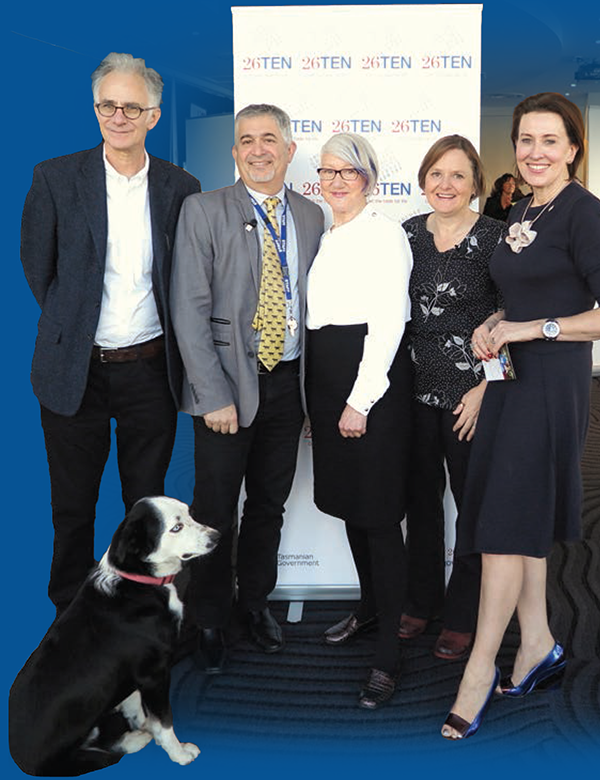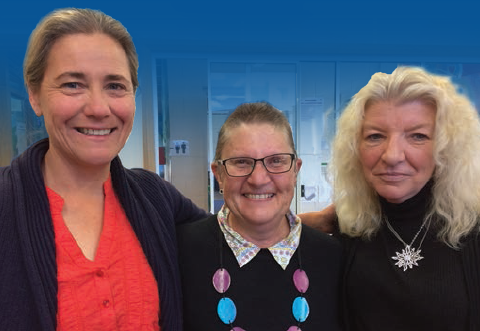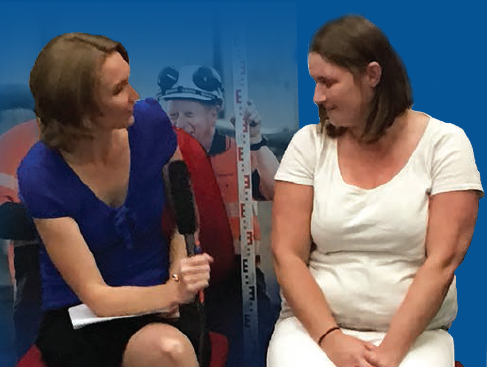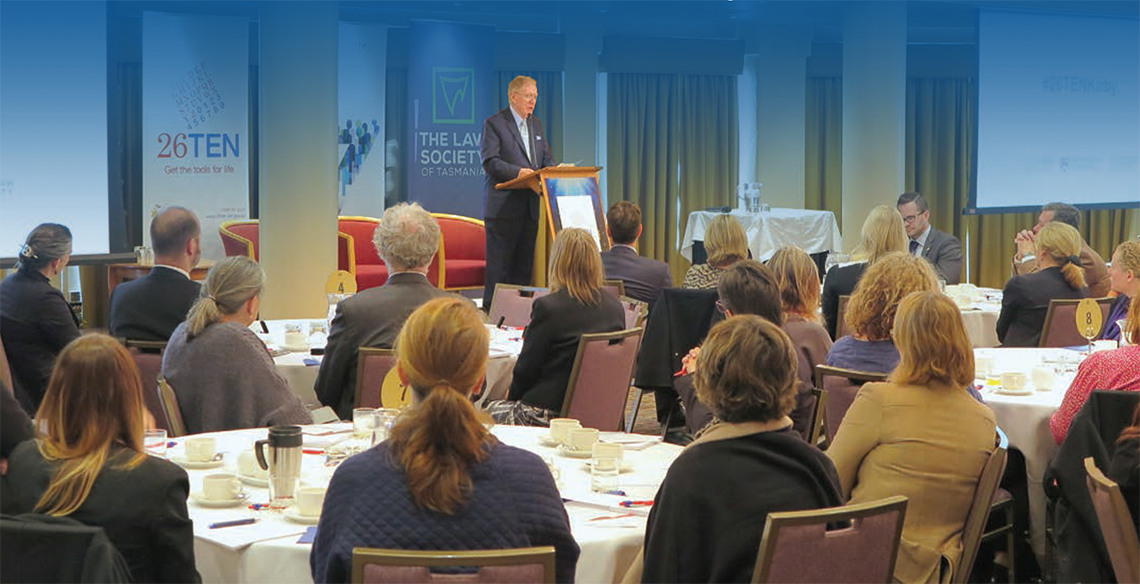26TEN Tasmania: Tasmania’s strategy for
adult literacy & numeracy 2016-2025
2017 Progress Report
26TEN Tasmania is a ten-year strategy for Tasmania. Its sets a framework for action by the whole state – business, community groups, government, education and training providers and individuals who want to live in a state where all adults have the reading, writing, numeracy and communication skills they need for life.
This report provides progress against the strategy. After five years, we will look at how far we have come as a state and what we have learned in more detail.
We assess our success through statistics and through stories that show the impact of 26TEN.
Our statistical targets are ambitious, population-level targets for increased awareness, increased adult literacy and numeracy skills levels, and increased commitment to clear communication. We will reach these goals over the ten-years if we all work together.
We have reported each year since 2015 against a range of markers in the 26TEN Action Plan October 2015-October 2017. The markers relate to the three goals of the 26TEN Strategy.

627 supporters and 138
member organisations
have taken action
in 26TEN.

Over 590 learned
about plain English
and over 960 completed
literacy awareness.
26TEN members have contributed to meeting the goals of the 2015-2017 Action Plan, in a range of ways, guided by their own 26TEN action plans. 26TEN Coalition members have implemented plans in their sectors. The 26TEN team, hosted by LINC Tasmania, has supported the efforts of the broader network.
Goals
GOAL 1
Everyone knows about adult literacy and numeracy
The message of 26TEN is spreading:
- Seventy-one per cent of Tasmanians surveyed were aware that adult literacy levels were a problem (Enterprise Marketing and Research Services 26TEN survey, March 2017).
- Seventy percent of those surveyed said they were confident they could help someone with low literacy to find the information they needed. This is an increase from 66 percent in 2016.
A broad collective effort across the State under the 26TEN banner has contributed to this. Individual supporters have spread the word throughout their own networks. 26TEN members have used their resources to help. For example, Metro Tasmania, posted family literacy posters in over 100 buses in 26TEN Week.
26TEN Coalition members have influenced their sectors in a range of ways including:
- Raising the profile of adult literacy with journalism students and staff at UTAS through the inaugural 26TEN Media Student Awards
- Expanding the Health Literacy Network, holding joint activities with the health sector and gaining acknowledgement of 26TEN and literacy messages in the Healthy Tasmania Strategy
- Promoting awareness of 26TEN in local government through the 2017 Local Government Conference.
Targeted television advertising and effective use of the 26TEN website and social media channels by the 26TEN team, have also broadened the reach of 26TEN.
And Tasmania has risen to the challenge. The numbers of new members and supporters who have joined the effort far exceed the targets set in
the first Action Plan. 26TEN now has 138 member organisations and 627 individual supporters. They have backed up their in-principle commitment with action and active engagement throughout the year.
In 2017, 26TEN delivered 37 26TEN literacy awareness workshops to over 629 people – well above target and the 26TEN telephone hotline service, averaged 16 calls per month.
Adult literacy and numeracy have been increasingly acknowledged as part of the broader debate of raising education and skill levels in Tasmania.
In 2017, 26TEN collaborated with other Tasmanian Education Department initiatives including the B4 Coalition, Learning in Families Together (LIFT) and Launching into Learning (LiL). Over 50 early learning providers attended the 26TEN LINC Tasmania Children’s Laureate Panel discussion on family literacy, hosted by Virginia Trioli. 26TEN’s engagement with the Peter Underwood Centre continued and was supported by deepening engagement with the Law and Media Faculties of the University of Tasmania.
In 2017, 26TEN continued to work with the Tasmanian Aboriginal community across the State and began work on culturally-appropriate member plans. 26TEN also contributed to the Aboriginal English Literacy and Numeracy Action Statement for the Northern Territory and the Indigenous Literacy Foundation.
We spread the 26TEN message beyond the State, responding to invitations to speak of Symposium Action for Change: Indigenous Adult English Language, Literacy and Numeracy in Darwin, and to host the National and State Libraries Australasia Literacy and Learning Group in Hobart and Huonville during 26TEN week.
Case Study
Virginia sets a challenge about raising
family literacy levels in Tasmania.
Virginia Trioli, ABC journalist and broadcaster.
Virginia Trioli hosted the Q&A style panel discussion in August. The event highlighted the role of all Tasmanians in supporting the parents and carers who are their child’s first teacher. The event coincided with the visit to Tasmania of the Children’s Laureate, Leigh Hobbs.
The audience included many people who work to build literacy with young children. The panel outlined ideas they had used which actively engaged parents and carers in building literacy with young children. These examples emphasised the benefits to all of having parents and carers working alongside the children. As a lead up to 26TEN Week, Virginia challenged all members in the audience to organise an activity for families to read, write and count together and to share their event online.
Naturally, they took up the challenge. During 26TEN Week, over 80 events were organised across the State by a wide range of organisations who interact and engage with children and their families. It’s estimated that well over 1600 children and adults celebrated 26TEN family literacy.

The Panel: Leigh Hobbs - Australian Children’s Laureate, Bill Jarvis - College Principal, Sue Howard - Manager 26TEN, Lesley Mackay - General Manager, Smith Family, Virginia Trioli - ABC TV News Breakfast presenter and Panda the therapy dog.
Goals
GOAL 2
Everyone is supported to improve their skills
and to help others
26TEN members who provide literacy support helped thousands of Tasmanians to improve their literacy and numeracy skills during 2017. People received this support through LINC Tasmania, Registered Training Organisations, TasTAFE, community service providers and community groups.
The LINC Tasmania Literacy Service provided tailored literacy and numeracy support to 1183 Tasmanians in 2016-17 with positive outcomes including increased skills and confidence. The service was supported by over 330 volunteers who gave up their time to support 26TEN goals. People were also able to raise their skills in their workplace through the 26TEN grants program. Twelve organisations received grants in 2016- 2017 helping hundreds of employees with low literacy become better skilled for their work roles. Many organisations also took the opportunity to use clearer communication to help all employees better understand work requirements and processes.
Two communities received 26TEN grants in 2017. These grants, and grants awarded the previous year, are assisting communities in St Helen’s, Glenorchy and the Huon Valley. They support raising awareness of literacy issues and encourage those in need to access literacy help in their community. The Huon Valley 26TEN community is trialling a model of community-based volunteer literacy mentors to expand the ways in which people can get the help they need.
In 2017, the literacy and numeracy practitioner workforce became a sector focus of the 26TEN Coalition. Literacy service providers came together to start strengthening this sector, to ensure all people are able to get the help they need, when and where they need it.
Over 170 literacy and numeracy practitioners – independent contractors and staff of RTOs, LINC Tasmania and TasTAFE – benefited from 26TEN professional development activities improving their capability to help others. LINC Tasmania continued to implement a targeted internal professional development program. This ensures it can provide the best possible literacy and numeracy support that is based on evidence about what works. 26TEN and LINC Tasmania worked together to develop a platform for sharing resources for practitioners, to further support the collective effort.
Member activities throughout the year helped people gain skills and confidence in reading, writing, maths and oral communication. Over 80 locally-based events were run by 26TEN member organisations targeting family literacy during 26TEN week.
Stories of the way in which better literacy and numeracy has changed people’s lives – at least 65 collected from LINC Tasmania literacy clients alone – continue to show that 26TEN is making a difference.
Case Study
Great results for volunteers increasing their literacy and numeracy skills
Neighbourhood House
Volunteers at Starting Point Neighbourhood House in northern Tasmania are successfully building their skills in literacy and numeracy so that they can help others in their community. The Neighbourhood House ran a project using a 26TEN grant. Their project is called Link Up! Local volunteers train to be mentors and literacy tutors in the community.
“What we have noticed is the astounding increase in confidence,” the Neighbourhood House team reported. Lizzie James and Rosie Staak both completed literacy tutor training and are now working with clients in their community.

Mary Rummery (Project Leader), Rosie Staak and Lizzie James (community literacy tutors) at LinkUp!
Media students learn about supporting people with low literacy
Mock media event
Angela Ross, ABC journalist and newsreader and member of the 26TEN Coalition, played herself at mock media event about adult literacy for media students at UTAS. She interviewed a Literacy Coordinator from LINC, Alisha and Mark two literacy clients from Glenorchy LINC, Alisha’s volunteer tutor, and Kym Goodes, CEO of TasCOSS who is also a 26TEN Coalition member.
The university students were clearly moved when Alisha and Mark were open about their struggles with reading and writing. They both spoke proudly and with confidence about the difference the LINC literacy program and 26TEN had made in their lives.
The UTAS students each wrote an article based on the mock media event and the best won a prize. Kasey was the winner of the best article. Alisha and Kasey also spoke on ABC Hobart Breakfast.

Angela Ross interviewing Alisha at the mock media event at UTAS.
Goals
GOAL 3
Everyone communicates clearly
26TEN members are embracing the need for clear communication in workplaces, community groups and government. In the 2017 calendar year, 26TEN ran 42 plain English workshops with over 565 participants from a wide range of organisations across the State.
In their action plans, many 26TEN members have committed to using more plain English in their workplace communications. Members, Metro Tasmania, the Faculty of Law, UTAS, the National Disability Service and the Tasmanian Aboriginal Corporation have led the way in revising organisational documents for their staff and service users. The Faculty of Law and the Tasmanian Law Society worked with 26TEN to host a panel discussion on using plain English in the legal profession. The panel featured Hon Michael Kirby AC CMG, Rowena Holder from the Guardianship and Administration Board and Hamish Locke from the Tasmanian Aboriginal Legal Centre, and was attended by over 80 people.
State Government agencies have met commitments to use more plain English by giving staff access to training and by investing the time needed to re-writing public documents. 26TEN has also contributed to writing guides for State Service staff, including:
- The Department of Education Good Writing Guide
- The LINC Tasmania Plain English Guidelines
- The Department of Premier and Cabinet, Cabinet Writing Course for new graduate employees.
26TEN works with the Department of Education to present workshops for teachers on writing student reports and newsletters in plain English at the DoE’s Professional Learning Institute. In responding to requests for workshops to be delivered at schools, we developed a course that now runs on-site for teachers in government schools.
We continue to investigate how to encourage and reward best practice in clear communication and support it being used plain English in a sustainable way. This work will be consolidated in the coming years.
Case Study
Hon Michael Kirby reminds legal practitioners to “Write for the People”
Plain English month breakfast panel
In early May, Hon Michael Kirby AC CMG, Hamish Locke, State Director of the Tasmanian Aboriginal Community Legal Centre and Rowena Holder, President of the Guardianship and Administration Board (Tasmania) supported plain English month at a breakfast panel with the theme “Write for the People: the law and plain language”. The Law Society of Tasmania, the Faculty of Law at the University of Tasmania, and 26TEN (through Tim Tierney, the member of coalition for the legal sector) hosted the breakfast panel.
All panel members stressed how important it is to use plain language so that people in the legal sector can assist the vulnerable and those with low literacy to better participate. The law affects everyone and at some stage in our lives we will have to deal with a legal situation – be it renting a home, making purchases, making a will or signing an employment contract. They also outlined that using plain English is not only about writing – it includes using effective oral communication as well. Having legal representatives uphold the principles of plain language supports the profession’s commitment to human rights.

Hon Michael Kirby addressing the audience with his ten hints for using plain language.